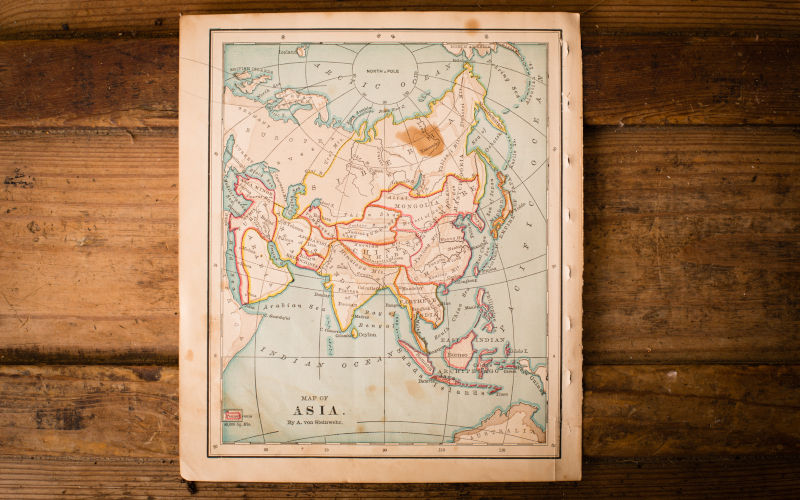Australia should rid itself of the persistent fear of China
October 17, 2022
Australia must overcome Sinophobia and rejoice in a future in the Asian region.
_
_
As a child growing up in Sydney in the 1950s, I recall my elders showing me a map of our region, with big red arrows pointing downwards from China to Australia.
It was almost as if gravity was helping the evil red menace to conquer Australia. Of course, we all know the earth is a sphere, but the red downward thrust seemed to jibe with the traditional yellow peril to generate a strong image of fear of China. Naively, I thought wed overcome it in the decades following 1972. And yet here we are again and Scott Morrison, among others, had no trouble bringing it back! One cant help wondering why this Sinophobia is so persistent.
Racial white supremacy goes back a long way in Australia. There is a great deal of uncertainty spawned by the fact that the British simply took over this enormous continent and then settled it, initially largely for convicts, without asking anybodys permission. The lack of self-confidence has clung to us, making us hanker after England on the other side of the world and forgetting or regretting that we are in the Asian region, and always shall be. Who could have imagined that over 250 years later, the head of the Australian state would still be the English king?
As for the Chinese, their history in Australia is only a little shorter than that of the British. They did not come as conquerors, yet they were regarded with distrust. Indeed, hostility towards the Chinese was one of the driving forces behind the push for federation. The Immigration Restriction Act of 1901, the so-called White Australia Policy, was specifically directed against Asians, in particular Chinese. That was a very good example of the yellow peril notion.
But the British-derived Australians looked down on them as inferior. China itself was large, looming over our region, and dangerous. The Americans had the notion of the yellow peril, even formalising it into the Chinese Exclusion Act of 1882, and Australia was happy to agree. And it was part of European colonialism to fear threat from the very people the Europeans threatened and to call them insulting names based on race.
It was not until 1973 that the Whitlam government formally rejected the idea that race was in any way relevant to immigration. The yellow peril notion was discarded but it remains active in the Australian imagination and easy to revive. When some politician comes along and sees it as useful to exploit Sinophobia for political gain, its easy to press the right button and bring it back again, though not under that name. Pauline Hanson is not the only one who has been able to do that. Though it would not say so, a 2018 law demanding transparency in foreign influence was aimed largely against the Chinese.
Fortunately, the number of Australian residents of Chinese origin has expanded greatly. The 1986 census gave the number of people of Chinese ancestry as 201,331. Reporting on the 2021 census, the Australian Bureau of Statistics stated that 1,390,637 Australian residents identified themselves as having Chinese ancestry, accounting for 5.5% of the total population. Thats a big rise and very good for Australia.
Then theres the other side of the coin: the way we cling to allies like the United States. This is historical too. The United States did indeed save Australia against Japan in World War II. But to imply an equivalence between the new and rising China to imperial Japan, as some like the current Leader of the Opposition Peter Dutton have done, is dangerous nonsense. Not only was China the most seriously affected victim of Japan, but it has never behaved like Japan. Unlike the United States, which has been at war most of its history and repeatedly sent troops to conquer others, China has not sent troops outside its borders since the short border war with Vietnam in 1979. Unlike the United States, China has never exported its ideology.
I would point out that Australias dependence on great allies like the United States has little benefit for us. Most of the wars into which we have followed the United States have little or nothing to do with us. I think there is something cultural, maybe even racial, in the way our leaders fawn on, and our media follow, American counterparts while keeping their distance from Chinese.
Referring to the interview Keating gave two days earlier on La Trobe Universitys Ideas and Society Program, an article by Greg Sheridan in The Australian of 14 October 2022 was headlined Alas poor Paul Keating, for he hath truly lost the plot. I have to say I think it is Greg Sheridan and The Australian that have lost the plot. Keating is dead right to say we must respect China, get away from the Anglosphere represented by AUKUS and stop outsourcing our strategic sovereignty to the United States.
We followed the United States into the delusion that China would democratise and become more ideologically like us, rather than follow its own path. We were/are happy to trade and make money out of China. But as for power, the United States seems to find it impossible to deal with China on an equal basis and too many of Australias leaders are influenced by this attitude.
We have got far too used to a comfort zone in the Anglosphere, despite our multiculturalism. And I fear there is more than a tinge of racism that helps to keep the fear of China not only alive but sometimes even strong. We must overcome this Sinophobia and rejoice in a future in the Asian region.

